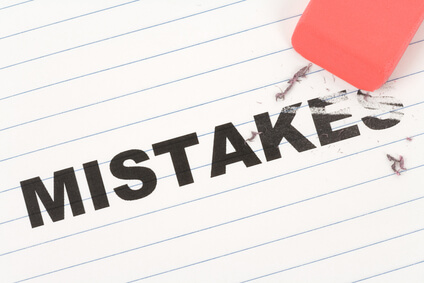We all make mistakes with our finances. I’m not talking about making hard decisions and choosing which bills to pay and which to leave for another month. These are simple financial choices and the biggest money mistakes American workers are making with their paychecks.
The economy is still struggling, and far too many employees are turning away free money and lending other money from their hard-earned paychecks to the government free of charge.

Three Biggest Money Mistakes…
1. Not Capturing Their Employer Match
According to a recent study conducted by the Financial Industries Regulatory Authority (FINRA), almost 30% of American workers do not contribute enough to their 401k retirement plans in order to capture their employer’s matching contribution. Typically, many employers match dollar for dollar the first 3% or more of their employees’ paychecks in 401k retirement plan contributions.
So, for example, if you earn $50,000 per year before taxes, your employer will match the first $1,500 that you contribute to your retirement plan. So, at the end of the year, you will have $3,000 in your account without even factoring the change in share prices. That’s the equivalent to a 100% rate of return.
Where will you ever find a 100% rate of return even in a bull market? Why would you not contribute that $1,500 in order to earn another $1,500?
Because it is pretax dollars, we aren’t even talking about reducing your take-home pay by $1,500. It would reduce it by about $1,000 depending on your tax rate. I was blown away by reading that 30% of American workers are still leaving free money on the table at work.
2. Not Minimizing Their Tax Bill
Do you invest in your company’s 401k over the match? Are you maximizing your Roth IRA? I am a big fan of Roth IRAs and the tax advantages they offer.
Unlike 401k retirement plans, Roth IRAs allow investors to withdrawal both principle and interest tax-free in retirement. Roth IRAs require investors to pay their taxes when they make the contributions, and 401k plan investments grow tax-deferred where you will have to pay when you withdrawal the money.
These are both great plans, but the real benefits come down to simply when you want to pay your taxes. Do you want to pay them now? Or, do you want to wait decades down the road and pay them later?
I know what my tax rate is now, and it is very low. For me, it makes more sense to try and maximize my Roth IRA contributions and then invest in a 401k. Of course, as we talked about before though, it always makes sense to contribute enough in a 401k plan first in order to capture any employer contributions.

3. Loaning Too Much Money to Uncle Sam
Do you get a huge income tax refund back at the end of every year? My wife likes to think of this as her yearend bonus. What it really is in all actuality is a tax-free loan that we are giving to Uncle Sam. This is another one of the biggest money mistakes that American workers make.
Every month you have taxes taken out of your paycheck based on your estimates of how much taxes you will have to pay at the end of the year. When you file your income tax return in the spring, you are actually simply just settling up with the government. If you estimated wrong and get a refund, you paid too high a percentage of your pay every month in taxes.
You could adjust your withholdings and take more money home each month. Like time value money calculations, an amount of money is worth more in the present than it is in the future. Your goal should be to have an income tax refund of almost zero.
That is the most efficient use of your money, and it does not give the government what essentially is an interest-free loan of your hard-earned paycheck each and every month. When you receive a refund at the end of the year, you are getting your own money back with no interest.
These were the three biggest money mistakes that workers make. Did I miss any? Have you made any of the biggest money mistakes with your finances and your job? Do you like large income tax refunds at the end of the year like my wife? I’d love to hear your thoughts in the comments.


All great points. Number one always blows me away. People who would buy endless raffle tickets, or even worse lottery tickets, don’t see the importance of investing in their future. Sad….
My company offered a SIMPLE IRA and the match sucked. It was a 3% match of what you pay. Pay in $100? Company matches $3.
Jason,
I had never heard or seen a company match an IRA. Are you sure it is 3% of what you pay and not 100% of up to 3% of your salary that you contribute? 3% is crazy low, but then again it is better than a savings account nowadays.
We have a defined benefit pension where I work that you can contribute to and the employer matches. It is awesome. I am getting free money for my retirement. Even when I have had less money I have always found a way to make my contribution.
I can understand where people have to let it go if they are struggling financially, but it should definitely be one of the last things that go. People should try and hold on to the free money for as long as possible if they can.
We aren’t maxing out my wife’s 401k, or my Roth IRA simply because we can’t afford it. I thought that next year we were going to be able to put more into those accounts, but our worthless insurance left us with a $4000 bill from my gallbladder surgury last month.
As far as the tax free loan, I always err on the side of caution, as do my parents and my brother. All of us have unsteady income. My father’s can vary as much as 20% from year to year! I actually think that I messed up my W-4 for my new job and will wind up owing money this year, and I am NOT happy.
Besides, that interest-free loan to Uncle Sam? over my working life, my tax returns have averaged about $1000. That’s about $20/week. Even if I had the capability of calculating my tax bill to the dollar at the beginning of the year and saved every dime of it, that works out to an extra $10 in my pocket each year.
Great article. Of the three I concur that getting the full 401(k) match is the biggest mistake. Getting a larger tax refund is a free loan to the government, but given this all occurs within the space of a single calendar year if someone uses this as a “year-end bonus” the time value of money over a single is not that big of a deal.
As far as Roths go, I both like them and don’t. The option to be able to take one’s money out tax-free later on is compelling. On the other hand the time value of money really comes into play here. What is the present value of some to be determined tax savings many years out vs. the value of the tax deferral now? Very complicated question calling for many assumptions. Clearly not the “no-brainer” the financial services industry tries to make it in order to generate business.
It’s hard to understand why folks wouldn’t take advantage of an employer match! Of course, you could save for retirement outside an IRA or other retirement plan by investing in tax free municipal bonds (or bond funds) – only if you can resist the temptation to use the money though.
We have done the estimated taxes for years and hate to get back money from the government. Maybe it is only a few dollars a year (less than that now) that we could earn on it – but for us, it’s the principal of the matter – keeping control of our own money as long as possible. Of course it is a pain to calculate and if you don’t do it right you could end up with a penalty.
Great article Hank. I think these are all excellent points, and a little it’s a little disturbing to see that how easily money is slipping through our hands. Another area where I see room for improvement, is keeping skills current. It’s too easy to go through the motions and expect that pay check to be there until you are ready to retire. But, the world is changing too quickly to expect the set-it and forget-it career strategy to be successful. Always be interested in learning new things and taking retraining opportunities when they’re presented to you.
I like a refund. I know I lose about 3-5% per anum but that is a sure shot way to save. Plus I learn to live in a smaller income. While math would say aim to have 0 refund, psychologically paying more upfront and getting a refund will aid you in the long run.